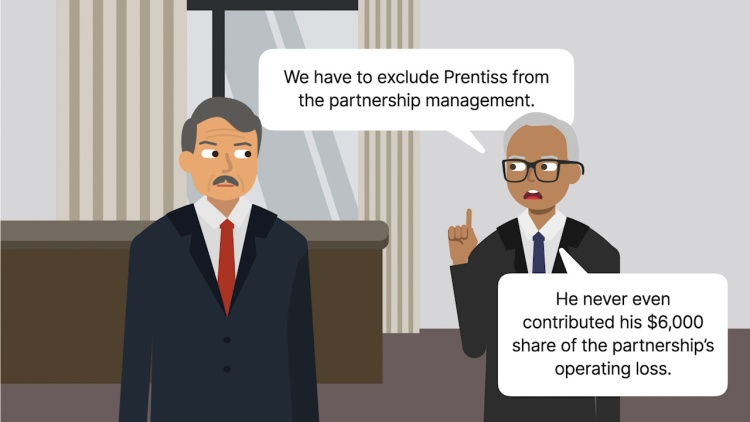Prentiss v. Sheffel
Arizona Court of Appeals
20 Ariz.App. 411, 513 P.2d 949 (1973)
- Written by Ronald Quirk, JD
Facts
Prentiss (defendant) and two other individuals, Sheffel et al. (plaintiffs), made an oral agreement to enter into a partnership to buy and operate a shopping center. The agreement did not specify any term for the partnership’s existence, nor did it delineate the operational or management duties of the respective partners. Sheffel et al. owned a total of 85% interest in the partnership, while Prentiss owned 15% interest. The partners engaged in many serious arguments concerning the title of partnership property, which resulted in an irreparable rift between Prentiss and Sheffel et al. Prentiss added to the problems by being unable to pay his proportionate share of the shopping center’s operating losses. Sheffel et al. subsequently excluded Prentiss from all management duties and sought dissolution of the partnership, alleging that Prentiss had been derelict in his partnership duties. Sheffel et al. also sought a court-supervised dissolution sale whereby they would bid on all the partnership assets. Prentiss filed a counterclaim, seeking to prevent Sheffel et al, from bidding on or purchasing the partnership assets. Prentess contended that he had been wrongfully frozen out of the partnership, and would be unfairly disadvantaged if Sheffel et al. were permitted to buy the partnership assets at a judicial sale. The trial court found that a partnership at will existed, and that Sheffel et al. dissolved it when they froze out Prentiss. The trial court also ordered a judicial sale of the assets and denied Prentiss’s request to prohibit Sheffel et al. from bidding on the partnership’s assets at that sale. Sheffel et al. were the high bidders in the judicial sale, and the trial court entered an order confirming the sale of the assets to them.
Rule of Law
Issue
Holding and Reasoning (Haire, J.)
What to do next…
Here's why 907,000 law students have relied on our case briefs:
- Written by law professors and practitioners, not other law students. 47,100 briefs, keyed to 996 casebooks. Top-notch customer support.
- The right amount of information, includes the facts, issues, rule of law, holding and reasoning, and any concurrences and dissents.
- Access in your classes, works on your mobile and tablet. Massive library of related video lessons and high quality multiple-choice questions.
- Easy to use, uniform format for every case brief. Written in plain English, not in legalese. Our briefs summarize and simplify; they don’t just repeat the court’s language.





